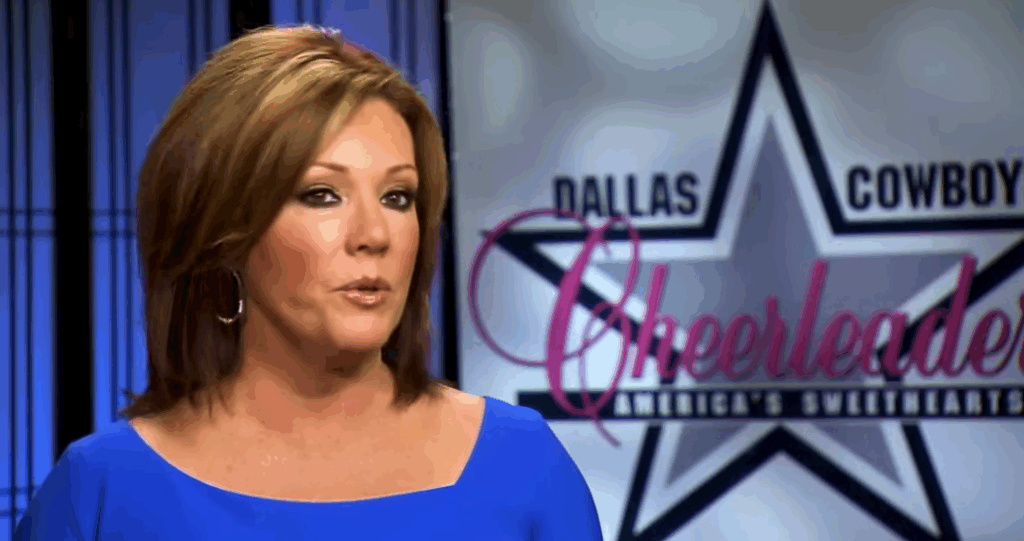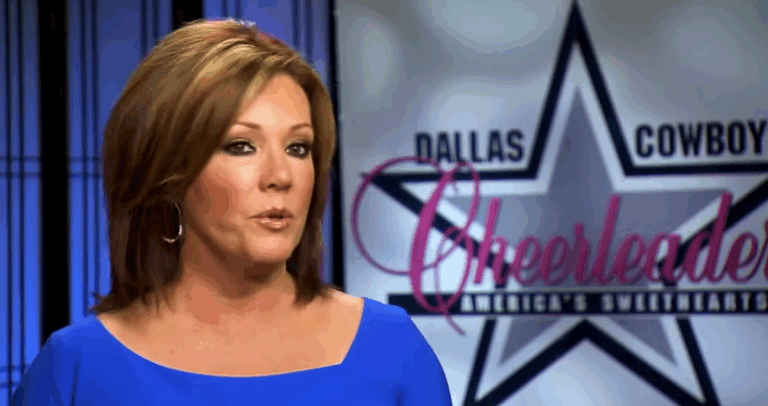With little fanfare, no drugs, and most importantly, no shame, Kelli Finglass, the powerful force behind the Dallas Cowboys Cheerleaders, quietly shed fifty pounds. She avoided the increasingly popular trend of using fast-acting weight-loss medications by sticking to a simple regimen of walking and calorie control. Despite being extremely personal, her metamorphosis had a significant impact outside of her own mirror, changing the way people talked about health, self-perception, and career expectations in performance-based fields.
Interest in Finglass’s appearance started to grow in the last few months, especially on social media and in entertainment news sources. However, the seasoned director made it very evident that, unlike Ozempic, she had not resorted to injections. Rather, she attributed her success to walking regularly and keeping a calorie deficit. Her candor was incredibly successful in gaining the public’s respect and trust in a time when celebrity makeovers frequently give rise to rumors of medical shortcuts.
Finglass is not only leading a dance team, but she is also redefining a cultural narrative by focusing on performance rather than weight-centric standards. She underlined that applicants to DCC are now evaluated on their appearance in their custom-made dancewear, which is based on proportions and health rather than scale numbers. In a remarkably symbolic departure from the one-size-fits-all norms that once dominated cheerleading environments, each uniform is customized.
Kelli Finglass Bio Table
| Full Name | Kelli Cecile McGonagill Finglass |
|---|---|
| Birthplace | Lindale, Texas, USA |
| Date of Birth | December 30, 1964 |
| Education | University of North Texas |
| Occupation | Director of the Dallas Cowboys Cheerleaders |
| Years Active | 1991–present (as Director) |
| Previous Roles | DCC Cheerleader (1984–1989), DCC Coordinator |
| Known For | Director of “Dallas Cowboys Cheerleaders: Making the Team” |
| Weight Loss | 50 pounds (as of 2024) |
| Method | Calorie deficit and walking (no medication) |
| Reference | eonline.com |

The shift was structural rather than subtle. Through the use of internal wellness resources, such as gyms, dietitians, and mental health specialists, Fingers has established a setting that provides dancers with comprehensive support. Many performers no longer feel as much pressure to adhere to a single aesthetic thanks to this strategy. It also says a lot about her changing leadership philosophy, which is to promote excellence rather than conformity.
She has developed a culture where showmanship and authenticity are valued through strategic leadership and decades of experience. Finglass freely expressed her preference for dancers who exude enthusiasm and interact dynamically with audiences. She prioritizes charisma, presence, and artistic command in addition to technical proficiency. For aspiring performers navigating a highly competitive field, this inclusive mindset is especially helpful.
Viewers were given an intimate glimpse of the rigorous training that goes into the cheerleaders’ flawless performances during the America’s Sweethearts Netflix documentary series. According to Finglass, the procedure starts long before the players show up at camp; only a small percentage of the dozens of women who try out virtually advance to the in-person rounds. After that, these hopefuls embark on a rigorous seven-week training regimen during which they master almost fifty routines.
Show-readiness, not silhouette, is the top priority for Finglass. She is adamant that dancers ought to be arena performers—women who can excite 80,000 AT&T Stadium fans—rather than just being attractive in crop tops. Her dedication to changing industry norms in ways that empower rather than limit is demonstrated by this philosophy, which has significantly improved in recent years.
Her decision to publicly reject quick fixes like weight-loss drugs resonates strongly in the context of celebrity culture. Many public figures either say nothing or provide evasive justifications for significant changes. In a time when transparency seems uncommon, Kelli’s decision to be open and honest is both refreshing and deeply reassuring.
Her behavior reflects broader shifts in entertainment and sports. Finglass’s change in standards joins an increasing number of voices calling for reform in performance aesthetics, much like the U.S. gymnastics team’s renewed emphasis on mental health or Lizzo’s vocal support of body positivity. By establishing a nurturing environment for her dancers, she makes it abundantly evident that individuality, skill, and health are no longer incompatible.
Despite the wide range of public responses, from awe to mistrust, Fingers has remained steadfast. Although she admitted that message boards frequently offer criticism or conjecture, she brushed these off as diversions. In an interview, she clarified, “That’s not my fuel.” Instead, she devotes her energy to creating a team that appeals to a wide range of fans so that everyone can find someone with whom they can connect.
Finglass’s subtle shift in expectations for body image stands out in a world where female leadership is scrutinized more closely than its male counterpart. She is modernizing a legacy organization to reflect a more inclusive and sustainable approach, rather than dismantling its traditions, by means of consistent action and reaffirmed values.
Through her professional and personal health transformations, Finglass is exemplifying a new leadership style that places an emphasis on authenticity, empathy, and realism. The way her story combines organizational culture with personal well-being is especially creative. She lost weight, but she also lost outmoded expectations.
Finglass’s impact is greater as cheerleading becomes more popular around the world and approaches Olympic status. Her choices will influence how aspiring team directors, young dancers, and even entertainment executives perceive performance and beauty. She is creating a trend rather than following one, and she does it in a very effective and profoundly human way.


